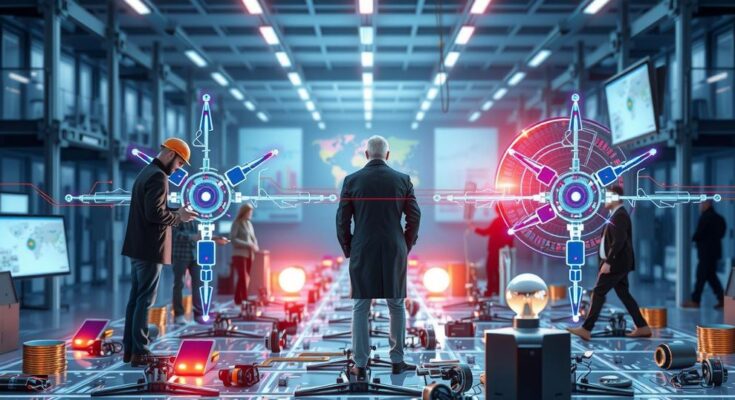Digital technologies, including AI and automation, are reshaping workplaces, bringing both benefits and risks. AI in recruitment reveals biases that affect candidate experiences, while digital monitoring can harm employee well-being despite its potential to enhance engagement. Workers increasingly collaborate with automated systems, highlighting the need for authenticity in these interactions. The economic implications of automation include shifts in workforce composition, indicating both opportunities and challenges for job security and social dynamics.
The influx of digital technologies, such as AI recruiting tools, industrial automation, and robotic assistants, is reshaping the contemporary workplace landscape. These innovations promise advancements in efficiency, productivity, and well-being, yet they also raise critical concerns about their impact on daily interactions among workers. A growing array of research shines a light on the complex ramifications of these technologies, highlighting both their benefits and risks. AI has significantly altered the hiring landscape by aiding recruiters in sifting through applications, yet it also introduces complexities and biases. Research indicates that candidates excited about potential employers and AI are more likely to proceed with applications. Conversely, those who feel anxious or distrustful towards AI may withdraw from the application process, suggesting that the incorporation of AI can lead to varied candidate experiences. One major concern is the possibility of automated systems perpetuating biases, even when gendering information is removed. A recent study suggests that advanced machine learning models can still identify a candidate’s gender, influencing their chances through implicit biases, such as when traits traditionally associated with masculinity affect a woman’s callback rate for interviews. Interestingly, the public tends to exhibit less outrage when they learn that algorithms rather than humans are responsible for discriminatory practices, which could imply that companies may not feel inclined to cease the use of AI tools in hiring processes. This phenomenon reflects a broader trend where the origin of the discrimination impacts the level of accountability perceived by individuals. The role of digital monitoring tools in the workplace has also expanded dramatically, raising questions about their effects on employee well-being. Researchers have found that electronic monitoring correlates with lower job satisfaction and heightened stress, potentially leading to counterproductive behaviors among employees. Consequently, while some advocate for monitoring’s efficiency benefits, outcomes suggest it may foster a detrimental working environment. However, effective electronic performance monitoring may also enhance employee engagement by being perceived as fairer than traditional systems. A study conducted in higher education settings revealed that such monitoring could foster stronger workplace identification, leading to greater investment and connection to their roles among employees. As automation advances, employees are increasingly working alongside robots or algorithms. Research indicates that authenticity plays a crucial role in the success of these interactions; individuals respond more positively when automated tools are presented authentically, underscoring the need for transparency. Contrary to expectations, individuals may prefer algorithmic advice for specific types of decisions, especially in estimations. However, when it comes to making final decisions, there remains a preference for human input. Employees also desire clarity about an AI’s decision-making process, as shown in a study within a healthcare context, where explanations for AI suggestions significantly increased acceptance and integration into practice. Reflecting macro-level consequences, the rise of automation correlates with social health trends, such as increased mortality rates and rising anti-immigrant sentiment, which arise as job security concerns grow among workers. This highlights complexity in the interplay between technology, labor, and societal perceptions. Automation demands a different workforce composition. Research indicates an increase in hiring for more educated workers and flatter organizational structures, with fewer senior roles. Conversely, a drop in low-wage jobs that can be automated underscores a significant shift in the employment landscape. Overall, the evolution of digital workplace tools presents a complex narrative of potential reward and risk. As leaders navigate these waters, a delicate balance of optimism and caution is paramount. Relying on the latest data rather than instinct should guide informed decision-making to enhance workforce well-being amidst rapid change.
The article delves into how emerging technologies transform workplaces, focusing on AI in hiring, digital monitoring, and automation. It examines the dual nature of these technologies, presenting both the benefits they afford in terms of efficiency and productivity and the potential risks and biases they may introduce. The discussion also extends to macro-level societal implications stemming from automation.
In summary, while technology offers transformative potential to enhance workplace efficiency and satisfaction, it simultaneously presents considerable risks, including bias and diminished job security. Leaders must adopt a nuanced perspective, informed by thorough research, to navigate these changes wisely and reinforce worker well-being amid technological advancements.
Original Source: hbr.org



